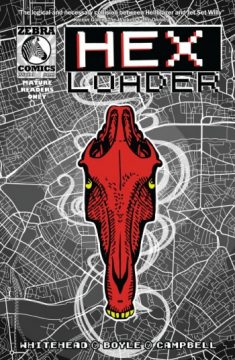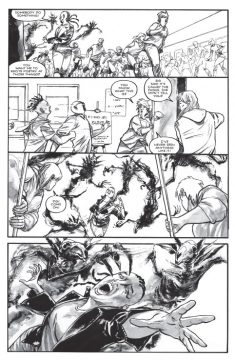Hex Loader #1-3 (Zebra Comics)
 In late 1979 Atari released Adventure on its 2600 console, a landmark title in the archives of video game history as it featured the first documented “Easter Egg” when Warren Robinett secretly coded his name into a hidden screen of the gam, influencing countless others over the subsequent years. Fast forward 39 years to 2018 and video games have become a huge element of popular culture, a significant proportion of the entertainment industry, the subject of ongoing debate as to what can be considered art and, perhaps most importantly, a core theme in the story of Hex Loader, the third issue of which launched at the recent True Believers Comic Festival.
In late 1979 Atari released Adventure on its 2600 console, a landmark title in the archives of video game history as it featured the first documented “Easter Egg” when Warren Robinett secretly coded his name into a hidden screen of the gam, influencing countless others over the subsequent years. Fast forward 39 years to 2018 and video games have become a huge element of popular culture, a significant proportion of the entertainment industry, the subject of ongoing debate as to what can be considered art and, perhaps most importantly, a core theme in the story of Hex Loader, the third issue of which launched at the recent True Believers Comic Festival.
 Publisher: Zebra Comics
Publisher: Zebra Comics
Writer: Dan Whitehead
Artist: Conor Boyle
Price: £3.99 from Comicsy
With Hex Loader, writer, Dan Whitehead returns readers to the 1980s and delivers a story that combines the concepts of art and creation with supernatural horror and this renaissance era of video game creation. While at first glance this may seem like an unlikely juxtaposition, the topics have far more crossover than simply the homophonic nature of the word Hex. This is a theme explored further as the story develops and it becomes increasingly clear that there’s far more depth to the concept here than just plying the readers with imagery of pixelated horrors.

The story begins firmly grounded in reality as protagonist David, a young, ill organised junior programmer at a Manchester software company receives a package from Declan, an old school friend and pseudo-legendary programmer who nobody has heard from for some years. The contents of this package prove to be the catalyst which set a series of sinister and inexplicable events into motion which, over the course of these first three issues drive David into encounters with a bizarre array of allies and adversaries, as he struggles to uncover the reason behind Declan’s message and the motives of the forces involved in a previously invisible struggle.
Aside from the overarching themes of the story, the overall presentation leans into the 80s nostalgia theme comfortably enough to raise a knowing smile from those who experienced UK 80s culture the first time around. But successfully avoids falling into the trap of referencing so much that the story either devolves into parody or becomes less appealing to those without a personal connection to the era.
Visually, Conor Boyle’s artwork shines, particularly in action scenes where the barriers between realities are blurred and in the creature design which makes any encounter with the enigmatic “Fugue” an unsettling affair. While some panels, particularly during some dialogue exchanges, are deliberately sparse in background detail this is typically not to the overall presentation’s detriment, though it can come as a surprise when such a panel occurs in close proximity to neighbouring scenes where the background is more flashed out.
With action, ever increasing thematic depth and a compelling delivery to date, Hex Loader is a series easy to recommend and one with potential to build to into something extremely satisfying, channelling H.P Lovecraft and H.S Warshaw in equal measures.




February 5, 2026 @ 3:07 pm
how to start buying stock https://otvetnow.ru sell gold nj
February 6, 2026 @ 3:03 am
https://askoff.ru